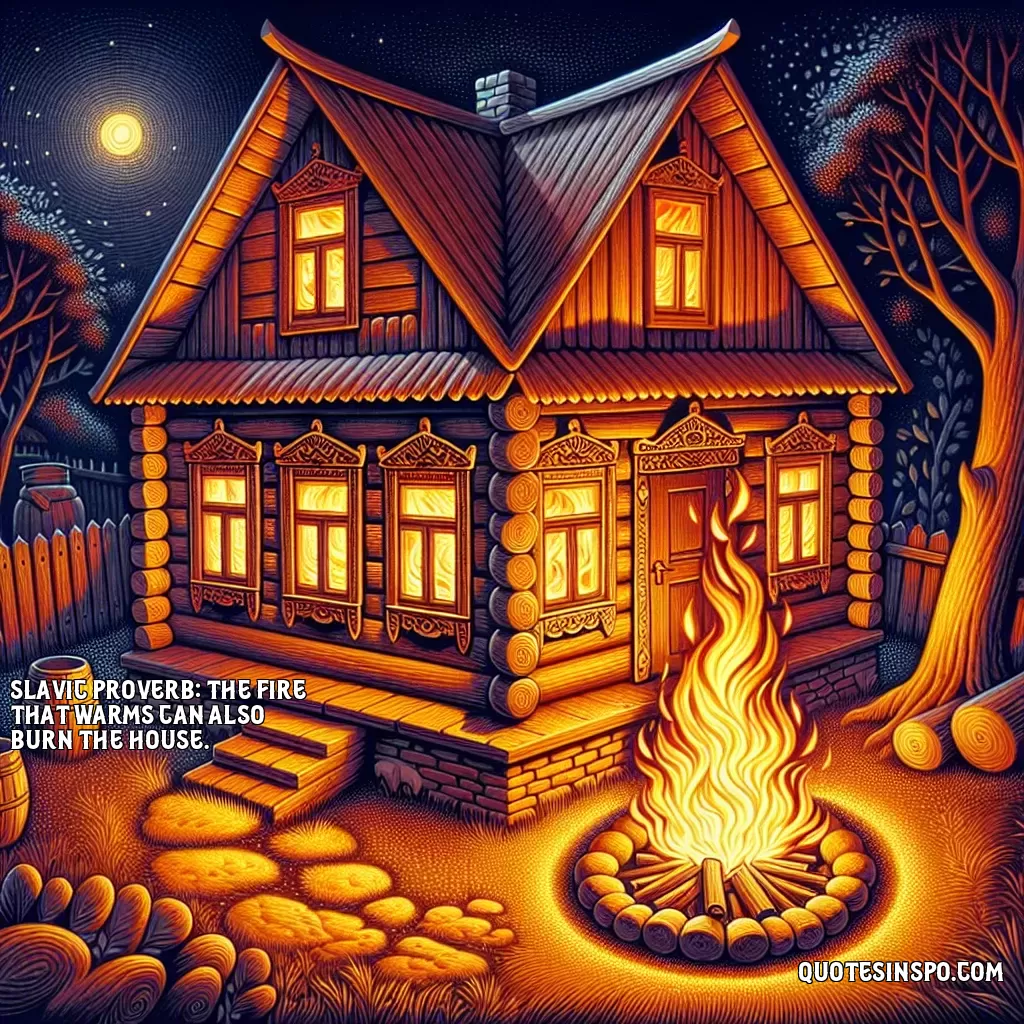
Slavic Proverb: The fire that warms can also burn the house.
The Slavic proverb "The fire that warms can also burn the house" serves as a powerful metaphor highlighting the dual nature of many elements in life. At its core, this saying emphasizes the concept of balance and the need for careful handling of resources, emotions, or situations that carry potential benefits as well as inherent risks. Fire, in this context, symbolizes a resource or a force that can provide comfort, energy, and sustenance. Used judiciously, it represents the warmth and nourishment necessary for survival, embodying safety and security when kept under control. However, the proverb warns of the destructive potential that this same force holds if not managed properly. Fire, if neglected or misused, has the capacity to wreak havoc, consuming everything in its path, including the very shelter it was meant to warm. This duality can be extended to various aspects of life, including personal relationships, emotions, technology, or power. Consider emotions like love or passion; they can be a source of joy and fulfillment, yet intense and unchecked, they may lead to possessiveness or conflict. Similarly, technological advancements bring immense benefits to humanity, but when improperly controlled, they can lead to harmful consequences. The proverb serves as a timeless reminder of the importance of maintaining balance and understanding the nature of the forces we engage with. It encourages mindfulness, responsibility, and respect for the potential consequences of our actions. This wisdom calls for a recognition that even beneficial forces require careful stewardship to prevent them from becoming sources of harm.
Quote By: Russian Proverb
**Russian Proverb: Echoes of Wisdom Through the Ages**
Russian proverbs are a rich tapestry of cultural wisdom and life lessons, woven through centuries of oral tradition and folk culture. These nuggets of wisdom, often characterized by their concise and poignant nature, encapsulate the spirit of Russian life and reflect the values, struggles, and joys of the people. They serve not only as moral guidance but also as a means of social cohesion, preserving the collective knowledge of generations past.
One remarkable aspect of Russian proverbs is their ability to convey complex ideas in simple terms. Many Russian proverbs have transcended regional dialects and historical contexts, finding relevance even in modern times. For instance, the proverb "Better to be poor but free than rich but a slave" reflects the enduring spirit of independence deeply rooted in Russian history. Such sayings resonate with individuals seeking to navigate the challenges of life, reinforcing the notion that character and values often outweigh material wealth.
Scholar and folklorist Vladimir Propp made significant contributions to understanding Russian proverbs by analyzing their structure and function within the narrative traditions of the country. Through his work, Propp highlighted how proverbs serve as both literary devices and practical advice that guide people in their daily lives. The cultural significance of Russian proverbs can also be seen in the works of renowned Russian authors like Leo Tolstoy and Anton Chekhov, who often incorporated these sayings into their stories, thereby preserving and popularizing them for future generations.
Russian proverbs are not merely relics of the past; they continue to influence contemporary Russian society. In an age of rapid change and globalization, these proverbs remain a source of wisdom, urging individuals to reflect on their values and choices. As people around the world seek meaning and guidance, Russian proverbs stand as a testament to the universal quest for understanding and truth.
In conclusion, the legacy of Russian proverbs, explored by scholars like Vladimir Propp and echoed in the literary works of authors such as Tolstoy and Chekhov, is a valuable aspect of Russian heritage. These distillations of life wisdom continue to resonate, illustrating the timeless nature of human experience and the sharing of knowledge across cultures and generations.